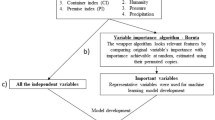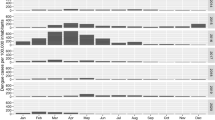Abstract
This paper presents the results on the model creation for predicting dengue cases in Baguio City, Philippines. In this paper, machine learning models such as Random Forest, Linear Regression, Support Vector Machines (SVM), and Gradient Boosting are tested for their prediction accuracy in modeling the number of dengue cases in five barangays of Baguio City that have the most number of dengue cases yearly. In modeling the monthly dengue cases, meteorological factors and time related factors, were considered as input features to the models. Results have shown that the least performing model is the SVM. The linear regression achieve optimal performance with only minimum feature inputs while the Random Forest and the Gradient Boosting methods achieve comparable prediction errors to that of the linear regression models. Furthermore, optimal results of the random forest was achieved with Time-related features and the meteorological factors, specifically the rainfall (RF) and relative humidity (RH). These two models also achieved lower errors in predicting dengue cases specifically during the peak months, as compared to using linear regression models.
Access this chapter
Tax calculation will be finalised at checkout
Purchases are for personal use only
Similar content being viewed by others
References
W.H.O. (WHO): Public Health Surveillance. https://www.who.int/immunization/monitoring_surveillance/burden/vpd/en/
Esparagoza, C.: Challenges in the Philippine healthcare system: social determinants to health, health system strengthening and health engagement in development towards issues in equity (2020)
Walsh, M.: Dengue Part 2: The Mosquito and its ecology’ (2011). http://www.infectionlandscapes.org/2011/01/dengue-part-2-mosquito-and-its-ecology.html
Rizavel, A., Cassi, K.S., Addawe Balino, L.V.: Spatio-temporal pattern distribution of dengue infections in Baguio city, in Philippines. In: Mohd, M.H., Misro, M.Y., Ahmad, S., Nguyen Ngoc, D. (eds.) Modelling, Simulation and Applications of Complex Systems. Springer, Singapore (2019). https://doi.org/10.1007/978-981-16-2629-6_14
Magsakay, C.B., De Vera, N.U., Libatique, C.P., Addawe, R.C., Addawe, J.M.: Treatment on outliers in UBJ-SARIMA models for forecasting dengue cases on age groups not eligible for vaccination in Baguio City, Philippines. In: AIP Conference Proceedings, vol. 1905, p. 050028. AIP Publishing (1905)
Libatique, C.P., Pajimola, A.K.J., Addawe, J.M.: Bifurcation analysis of dengue transmission model in Baguio City, Philippines. In: AIP Conference Proceedings, vol. 1905, p. 030023. AIP Publishing (2017)
Addawe, R.C., Addawe, J.M., Magadia, J.C.: Optimization of seasonal ARIMA models using differential evolution-simulated annealing (DESA) algorithm in forecasting dengue cases in Baguio city. In: AIP Conference Proceedings, vol. 1776, p. 090021. AIP Publishing (2016)
Marigmen, J.L.D., Balino, L.V.A., Addawe, R.C.: Analysis of dengue incidence in Baguio, Philippines. In: AIP Conference Proceedings, vol. 2423, p. 070011. AIP Publishing LLC (2021)
Marigmen, J.L.D.C., Addawe, R.C.: Forecasting and on the influence of climatic factors on rising dengue incidence in Baguio city, Philippines. J. Comput. Innov. Anal. 1(1), 43–68 (2022)
Carvajal, T.M., et al.: Machine learning methods reveal the temporal pattern of dengue incidence using meteorological factors in metropolitan Manila, Philippines. BMC Infect. Dis.18 (2018)
Ramadona, A.L., Lazuardi, L., Hii, Y.L., Holmner, A., Kusnanto, H., Rocklöv, J.: Prediction of dengue outbreaks based on disease surveillance and meteorological data. PLoS ONE 11(3), 1–18 (2016). https://doi.org/10.1371/journal.pone.0152688
Author information
Authors and Affiliations
Corresponding author
Editor information
Editors and Affiliations
Rights and permissions
Copyright information
© 2023 The Author(s), under exclusive license to Springer Nature Switzerland AG
About this paper
Cite this paper
Addawe, J.C., Caro, J.D.L., Juayong, R.A.B. (2023). Machine Learning Methods for Modeling Dengue Incidence in Local Communities. In: Krouska, A., Troussas, C., Caro, J. (eds) Novel & Intelligent Digital Systems: Proceedings of the 2nd International Conference (NiDS 2022). NiDS 2022. Lecture Notes in Networks and Systems, vol 556. Springer, Cham. https://doi.org/10.1007/978-3-031-17601-2_38
Download citation
DOI: https://doi.org/10.1007/978-3-031-17601-2_38
Published:
Publisher Name: Springer, Cham
Print ISBN: 978-3-031-17600-5
Online ISBN: 978-3-031-17601-2
eBook Packages: Intelligent Technologies and RoboticsIntelligent Technologies and Robotics (R0)




